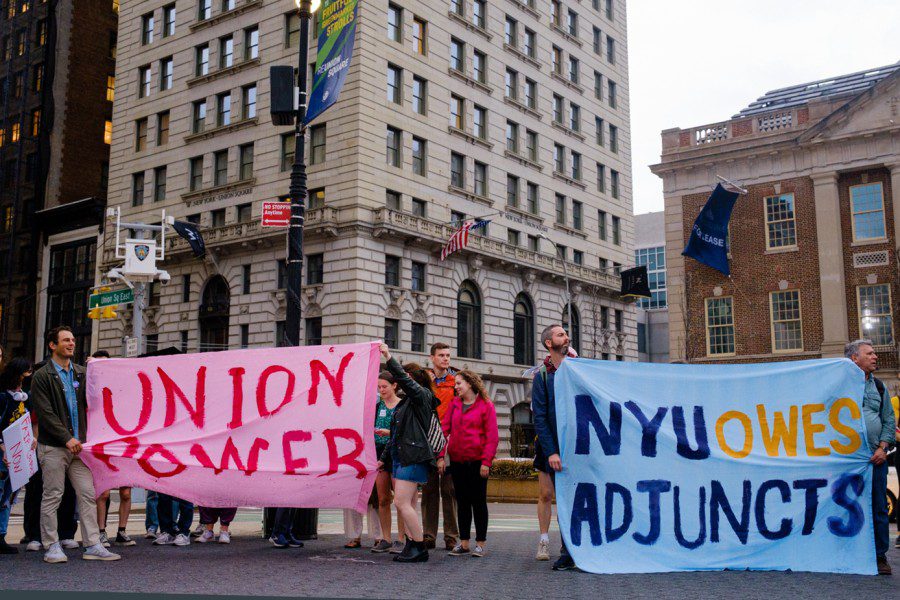The NYU adjunct union contract expires tonight. Here’s what may happen next.
The university’s adjunct faculty contract will expire at midnight on Oct. 31. A strike has been authorized, but it is only one of multiple possible outcomes for the labor dispute.
File photo: ACT-UAW Local 7902 at a rally in April 2022. (Samson Tu for WSN)
October 31, 2022
Adjunct faculty at NYU may go on strike this week. The adjunct union’s contract with the university will expire at the end of the day on Monday, Oct. 31, and the union has the authority to call a strike, after its members voted to authorize one on Oct. 24. The union has been unable to negotiate a new contract with NYU due to disagreements over proposed compensation, job security and health insurance.
The adjunct union has said they hope to avoid striking, but that they will stop work if they feel it is the only way to achieve a fair contract. The bargaining committee, made up of adjunct representatives, is the body empowered to call a strike.
The union’s current contract with the university — which was signed in 2016 — was first set to expire in August, but has since been extended twice to allow more time for negotiations. The union, ACT-UAW Local 7902, has agreed on some sections of the contract with the university, such as non-discrimination and academic freedom.
[Read more: Here’s what adjunct faculty do, and the details of their contract dispute with NYU]
Pending negotiations, the new contract will last from 2022-26, and the union, which represents adjunct and part-time faculty at NYU, is asking for protections including better wages, health care coverage, reappointment rights and retirement benefits. They are also calling on the university to provide funding for professional development and increased access to teaching resources, including facilities and technology.
What happens now?
After the expiration of the contract, one of four situations may occur, according to the union.
The first is that the union and university agree to extend the contract again to allow for more bargaining. This does not guarantee an agreement, but would delay a strike.
The second is that adjuncts can continue working without a contract. They would still be bound to most of the terms of their expired contract, and neither side could make unilateral changes to the agreement.
The third outcome is a strike, where adjunct workers would cease working until they come to an agreement with NYU. The union has said they hope to avoid this outcome unless it becomes necessary for a fair contract.
Finally, NYU could lock adjuncts out of their jobs, refusing to allow workers to work. A lockout would put the power in NYU’s hands, allowing it to make its own demands contrary to those of the union. The adjunct union believes this to be unlikely, as adjuncts are necessary for the semester to continue.
What would a strike mean?
NYU’s adjunct faculty has never been on strike, but the graduate student union went on strike last year, winning wage increases and better health care support. During the strike, which began in late April and lasted three weeks, some final exams were canceled or restructured due to a lack of teaching assistants to administer or grade them.
Unlike grad students, adjunct professors are typically the sole instructors for the courses they teach. For that reason, an adjunct strike would result in a greater number of canceled courses, and would likely have a greater overall impact on university operations.
According to the adjunct union, members will picket in front of Bobst Library if a strike occurs. Courses taught by adjuncts would have to either find a substitute instructor or be canceled. During the graduate student strike, the university maintained a “business as usual” policy, but was unable to implement it due to the lack of TAs. A similar situation may occur if the adjuncts strike, as they make up most teaching staff.
The union is urging students to support adjuncts, and in the event of a strike, to avoid attending adjunct-taught courses and instead join the adjunct picket line.
What are adjuncts calling for?
The union has centered their bargaining campaign on compensation and health insurance. Currently, adjunct faculty are only paid for time spent actively teaching, meaning that any additional work necessary to teach the course, such as creating materials or grading papers, is done without compensation. The union is calling for the university to pay one “administrative hour” per week, which would compensate the adjuncts for non-teaching labor. They are also calling for at least an 8% increase in wages across the board.
Adjuncts have also bargained for increased healthcare coverage, including lowering the minimum amount of work hours necessary to qualify for subsidized insurance from 84 to 56, a proposition which the university accepted.
The union is currently calling for more flexibility in insurance enrollment. Their most recent proposal calls for workers with qualifying life events or those who are hired mid-year to have the opportunity to enroll in insurance outside of the typical open enrollment period. Under the union’s proposal, the employment duration necessary to qualify for coverage would also decrease from one year to one semester.
In addition to compensation, the union is asking the university to send appointment letters — a form appointing adjuncts to a role and clarifying course requirements — 25 days before a semester begins. They are also calling for increased compensation for adjuncts whose classes are canceled either before or during the semester.
Contact Carmo Moniz and Tori Morales at [email protected].


























































































































































